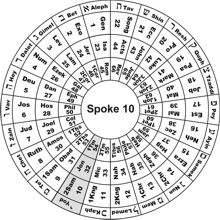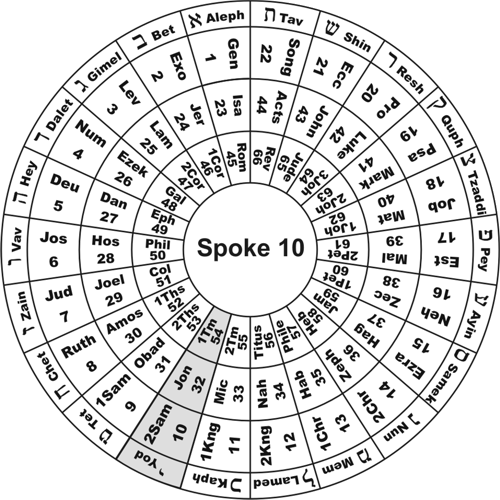The Ten Commandments
Now the end of the commandment is charity out of a pure heart, and
of a good conscience, and of faith unfeigned: From which some having swerved have
turned aside unto vain jangling; Desiring to be teachers of the law;
understanding neither what they say, nor whereof they affirm.
1 Timothy 1:5f (spoke 10, Cycle 3)
In the verse above Paul speaks of the "end of the commandment." This integrates
with the obvious emphasis on the Tenth Commandment found in 1 Timothy and its position
on Spoke 10 of the Wheel. But the integration of 1 Timothy with the Number Ten
goes well beyond emphasis on the Tenth Commandment. 1 Timothy
contains a mirror of the first nine of the
Ten Commandments - in order - in the following verses (vss. 1.8-10):
But we know that the law is good, if a man use it lawfully;
Knowing this, that the law is not made for a righteous man, but for the
lawless and disobedient, for the ungodly and for sinners, for unholy and
profane, for murderers of fathers and murderers of mothers, for manslayers, For
whoremongers, for them that defile themselves with mankind, for menstealers, for
liars, for perjured persons, and if there be any other thing that is
contrary to sound doctrine;
The table below presents the full text of the Ten Commandments side-by-side with the
full text of 1 Timothy 1.8-10. The correlations are astounding.
| The Ten Commandments | 1 Timothy 1:8-10 |
|
א I am the LORD thy God, which have brought thee out of the land of Egypt, out of the
house of bondage. Thou shalt have no other gods before me.
|
Knowing this, that the law is not made for a righteous man
This speaks of those made righteous
through faith in Christ and so are able to
obey in spirit and in truth. |
ב Thou shalt not make unto thee any graven image,
or any likeness of any thing that is in heaven above, or that is in the earth beneath,
or that is in the water under the earth: Thou shalt not bow down thyself to them, nor
serve them: for I the LORD thy God am a jealous God, visiting the iniquity of the
fathers upon the children unto the third and fourth generation of them that hate
me; And shewing mercy unto thousands of them that love me,
and keep my commandments. |
but for the lawless and disobedient
These are they who don't keep his
commandments as stated at the end of the Second Commandment
This integrates with the Law going forth on
Spoke 2 and
with the concept of the Word. |
ג Thou shalt not take the name of the LORD thy God in vain; for the LORD
will not hold him guiltless that taketh his name in vain.
|
for the ungodly and for sinners
These sinners are they whom God will not hold
guiltless. |
ד Remember the sabbath day, to keep it holy. Six days shalt thou labour,
and do all thy work: But the seventh day is the sabbath of the LORD thy God:
in it thou shalt not do any work, thou, nor thy son, nor thy daughter,
thy manservant, nor thy maidservant, nor thy cattle, nor thy stranger that
is within thy gates: For in six days the LORD made heaven and earth, the
sea, and all that in them is, and rested the seventh day: wherefore the
LORD blessed the sabbath day, and hallowed it. |
for unholy and profane
Both of these words describe violation
or the Fourth Commandment. |
ה Honour thy father and thy mother: that thy days may be long upon
the land which the LORD thy God giveth thee. |
for murderers of fathers and murderers of mothers
This part blends the Fifth and Sixth Commandments. |
ו Thou shalt not kill.
This integrates with the Sixth Day, when Adam and Eve were created. |
for manslayers |
ז Thou shalt not commit adultery.
This integrates with the meaning of the Number Seven as
Oath. |
For whoremongers, for them
that defile them- selves with mankind, |
ח Thou shalt not steal. |
for menstealers |
ט Thou shalt not bear false witness against thy neighbour. |
for liars, for
perjured persons, |
י Thou shalt not covet thy neighbour's house, thou shalt not covet thy
neigh- bour's wife, nor his man- servant, nor his maidservant, nor his ox,
nor his ass, nor any thing that is thy neighbour's.
One of the primary meanings of the Letter Yod is personal possession, as explained
in Holy Hands.
|
and if there be any other thing that is contrary to sound
doctrine;
The Tenth Commandment does not appear in this passage. Rather, it is spread
throughout the entire Epistle of 1 Timothy. This is dis- cussed in the article
The Tenth Command-ment: Covetousness. |
As a final note: If there is any doubt that this is the work of God, consider the
other possibilities. How could the Ten Commandments - the quintescence of the
Number Ten in Scripture - just happen to be found here on Spoke Ten of the Wheel?
And how is it that 1 Timothy contains the most famous statement concerning
covetousness - "The love of money is the root of all evil" (1 Timothy 6.10)?
I mention this because sometimes I fear the evidence may be missed - like
the proverbial trees - because of the overwhelming forest of facts.
|



